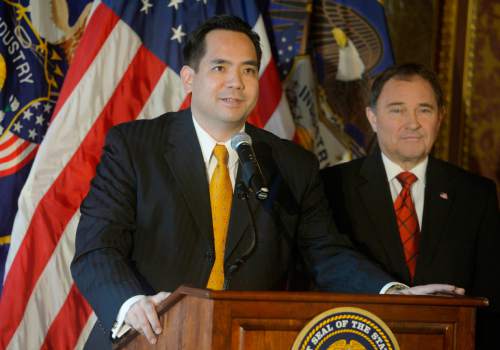This is an archived article that was published on sltrib.com in 2014, and information in the article may be outdated. It is provided only for personal research purposes and may not be reprinted.
Utah is joining 16 other states, led by Texas, in challenging the legality of President Barack Obama's recent executive orders aimed at giving deportation relief to millions living in the country illegally.
"This lawsuit is not about immigration policy," Utah Attorney General Sean Reyes said in a statement announcing Utah's role in the federal lawsuit. "The process is what is being challenged. The process is not legal. Regardless of how you feel about the policy, it does not justify implementation in an unconstitutional manner."
Reyes, a Republican, contends that it is up to Congress to change immigration law and the president cannot do it unilaterally.
Reyes said when Utah tried to enact state-level immigration reforms, it was met with opposition from the Obama administration, which said only Congress can change the immigration laws. Now, Reyes said, the White House is ignoring that contention.
"We need solutions from Congress. The president is not the only one frustrated by Congress's impasse on this issue," Reyes said.
Reyes notified Gov. Gary Herbert that he planned to join the Texas lawsuit, according to Herbert's spokesman, Marty Carpenter.
While the governor is frustrated with the lack of progress on immigration reform, Carpenter said, he also disagrees with the president acting on his own.
"He's said before [the broken immigration system] compromises our national security and hampers our economy," Carpenter said. "He's frustrated with Congress's failure to address the problems. But above and beyond all of that, the governor is a firm believer in the process. And at the federal level, what the Constitution provides is that laws are made by Congress, not the president. So he disagrees strongly with the president's unilateral action."
The lawsuit, filed Wednesday by Texas Attorney General and governor-elect Greg Abbott, asks the court to strike down the executive orders as an unconstitutional overreach by the president. The suit also contends that the orders will in fact exacerbate the humanitarian crisis along the U.S.-Mexican border.
Obama's order, announced Nov. 20, offered a reprieve from deportation and the right to work to an estimated 4.7 million parents of U.S. citizens and legal permanent residents who have lived in the United States for at least five years.
The White House said declining to deport the families was a form of prosecutorial discretion that the executive branch may exercise, but pressed Congress to pass comprehensive immigration reform.
"The reality is that for decades, presidents have used executive authority to enhance immigration policy," Homeland Security Secretary Jeh Johnson told the House Homeland Security Committee on Tuesday. "President Obama views these actions as a first step toward the reform of the system and continues to count on Congress for the more comprehensive reform that only changes in law can provide."
Lane Beattie, president of the Salt Lake Chamber, which has made immigration reform a top priority for years, said the legal issue is one that the courts and the attorneys general can focus on, but something has to be done to resolve the issue.
"The businesses of the United States are demanding and have been, not just for a month or two, but for years have been asking Congress to make changes," Beattie said. "If the president can defend [his actions], and he believes that he has the right to do whatever he did, some of them somewhat similar to [orders by] Ronald Reagan, then it's going to go the way it is. We're pleased there's something on the table that is creating some action, because it's much more important than it was a year or two years ago."
Archie Archuleta, past president of the Utah Coalition of La Raza, sees the lawsuit as purely political.
"It's bad policy. You need to look at constitutional policy and it seems to be well grounded in the past activities of presidents," Archuleta said of the executive order on immigration.
Utah and the other states suing are "barking up the wrong tree but the anti- feeling about President Obama is so deep and so ugly that any excuse to attack him is almost worth it to the people that hate him and, of course, the rest of us must foot the bills and it's very unfair.
"It's unfortunate that we're unable to have any kind of influence on our leaders in this state when it comes to this kind of action," he said.
In addition to Utah and Texas, the attorneys general from Alabama, Georgia, Idaho, Indiana, Kansas, Louisiana, Montana, Nebraska, South Carolina, South Dakota, West Virginia and Wisconsin joined the suit, as did the governors of Mississippi, Maine, North Carolina and Idaho. All of these officials are Republicans.
The New York Times and Associated Press have reported that the GOP-controlled House is prepared to approve a resolution this week declaring that the president does not have authority to make the immigration changes he did with executive action.
The vote is expected to be largely symbolic because there is little chance the Democrat-majority Senate will take up the resolution.
Twitter: @RobertGehrke



